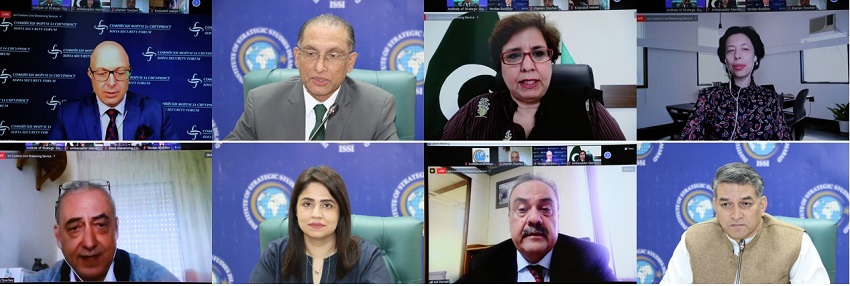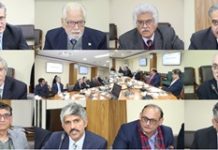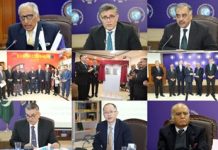Press Release
“Security Implications of Developments in Afghanistan- Views from Europe
and Pakistan”

The Center for Afghanistan Middle East and Africa (CAMEA) at the Institute of Strategic Studies (ISSI) in collaboration with the Sofia Security Forum, South East European Centre For Asia-Pacific Studies (SEECAPS) and the Embassy of Pakistan in Bulgaria held an online discussion titled Security Implications of Developments In Afghanistan – Views From Europe And Pakistan.
The opening remarks were given by Ambassador Aizaz Ahmad Chaudhry, Director General ISSI, who stated that it is necessary to get all the perspectives on Afghanistan. He further said that no country is more affected than Pakistan and that Pakistan has suffered for more than four decades and has also hosted refugees. He further said that the region and particularly Pakistan has suffered due to the lack of peace in Afghanistan. Mr. Yordan Bozhilov, President of Sophia Security Forum also stated that the EU and Pakistan are the main stakeholders in the region. H.E Ms Mariam Aftab, Ambassador of Pakistan in Bulgaria, in her welcome remarks said that such interactions help build bridges between scholars and stakeholders. Ms. Elena Atanasova-Cornelis, Founding Member of SEECAPS stated that the relevance of Afghanistan for the EU cannot be denied at this importance juncture.
The first session, “Dynamics in the South and Central Asia region. Factors, trends and directions of likely future developments in the region” was moderated by Mr. Yordan Bozhilov, President of Sofia Security Forum.
Speaking on the topic, Mr. Plamen Tonchev, MERICS European China Policy Fellow and Head of Asia Unit, Institute of International Economic Relations (IIER), Greece, Executive Director of SEECAPS was of the view that the trillion dollar question is what next in Afghanistan and where the situation in the country heading and what will the international community and Afghanistan’s neighboring countries going to do about it. He further said that two key factors which determine a country’s attitude to engage in Afghanistan are geographical proximity and willingness to engage with the Taliban and to what extent these countries are accepted by the Taliban. Moreover, he said a primary concern is that an unstable Afghanistan will bring about a surge in refugees and the resulting threats. While there are objections within the EU, it has become clear that the EU is reopening its diplomatic mission in Kabul in the coming month; however engagement with the Taliban is expected to remain limited. The EU will find it difficult to offer international recognition to the Taliban today because it cannot by pass its institutional constraints he further said.
Ambassador Asif Durrani, Former Ambassador of Pakistan to Iran, while shedding light on the topic stated that challenges in Afghanistan are becoming more serious with the advent of winters in Afghanistan and that we have to prioritize the problems as ten years ago there was no presence of Daesh in the country, but now with their presence, the situation is more challenging and dangerous. He further said that the US has to fulfill its obligations and delist the Taliban from the 1267 sanctions regime. Moreover, he said that the set up in Afghanistan should be inclusive and since international community has frozen 9.5 million dollars of funds, this will result in creating a catastrophic situation in Afghanistan. He said that the humanitarian crises in Afghanistan are one of the foremost challenges.
The second session, “Current Set-Up in Afghanistan – Role of Pakistan & Other Regional Actors,” had two discussants. Mr. Krzysztof Iwanek, Contributor to “The Diplomat”, Warsaw, Poland, while expressing his views talked about Pakistan’s past role in Afghanistan and its possible involvement with Taliban in the future. According to Iwanek, Pakistan has played an instrumental role in getting the Taliban into power in Afghanistan, by providing assistance to them for years. He said now that the Taliban have taken over Kabul, Pakistan’s relationship with most countries shall transform in a good way, with a few challenges. Furthermore, Pakistan may also help the Taliban regime in the near future by providing technological and economic assistance. Although Pakistan’s capacity to help is not huge, it can convince other states to provide assistance to the Taliban regime. He further said that Pakistan can play a key role in helping the Taliban gain international recognition. He also pointed out that the TTP will be labeled as an internal problem for Pakistan by the Taliban regime and Pakistan shall not receive any assistance from the group in this regard.
Speaking on the topic, Ms. Amina Khan, Director Centre for Afghanistan, Middle East & Africa (CAMEA), Islamabad spoke about the overall situation in Afghanistan, and said that while a lot is being said about Pakistan’s role which is perhaps not surprising considering the fact that Pak has become a convenient scapegoat, Pakistan’s relationship with the Taliban has been known, so has its stance which has remained consistent. Since 2001, Pakistan has been calling for a political solution to the conflict which includes the Taliban as a major component. She said that it is unfortunate that it has taken more than two decades of bloodshed, countless lives and wasted resources for the US to realize this. Pakistan has a relationship with the Taliban as do a number of countries within and outside the region. The Taliban have evolved and learnt the art of diplomacy where they have been extensively engaging with the international community which entails de -facto recognition moreover, the group has other sources of support. In fact if anything, the US legitimized the Taliban by signing the Doha agreement in the absence of Kabul and by announcing their withdrawal without getting anything substantial in return from the Taliban this emboldened the group. It is imperative that the international community remains engaged and provides much needed aid and assistance instead of shifting the onus, Afghanistan must be viewed as a collective responsibility she stated.
The third and last session titled, “Policies of the EU and Pakistan towards Afghanistan and the wider region,” had two speakers. The first speaker, Ms. Barbara Kelemen, Research fellow at the Central European Institute of Asian Studies (CEIAS) was of the view that the Chinese strategy for a long time has been to use the economic aspect to stabilize a country. She further said that China has interests in Afghanistan that are deeply tied to security and strategy. In this regard, China can help stabilize the country by using economic means. In strategic aspect, there is a history of Chinese engagement due to the close geographic proximity of China and Afghanistan. Talking about the security aspect, she said that border sharing and the history of militant groups plays an important role in shaping China’s interest in Afghanistan, especially when considering the Uyghur issue. China’s interests have been more prominent in the past 8 years and many important projects can be initiated by China in Afghanistan, involve connectivity, infrastructure, export and minerals she concluded. The last speaker of the third session, Dr Talat Shabbir, Director China Pakistan Study Center (CPSC), Institute of Strategic Studies, Islamabad, while expressing his views stated that the BRI (Belt and Road Initiative) is an ambitious project of China and is one among many. He also said that its effectiveness can be enhanced if the scope of connectivity that it offers is interpreted in a holistic way. BRI is a highly flexible arrangement with major projects in energy, infrastructure and transport sector, he stated. Moreover, he said that China being the global economic power is one of the prominent investors in Eurasia; therefore this deep engagement allows Beijing to make various connectivity routes passing from South Asia to Central Asia, Russia and Europe. Therefore, if peace and stability prevail in Afghanistan, the benefits of economic connectivity will multiply and that is why peace in the region and specifically in Afghanistan is of utmost importance.











